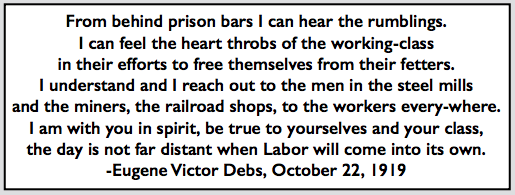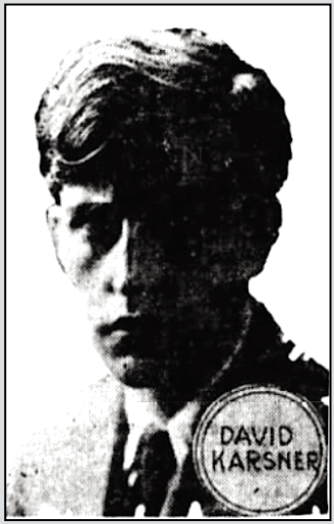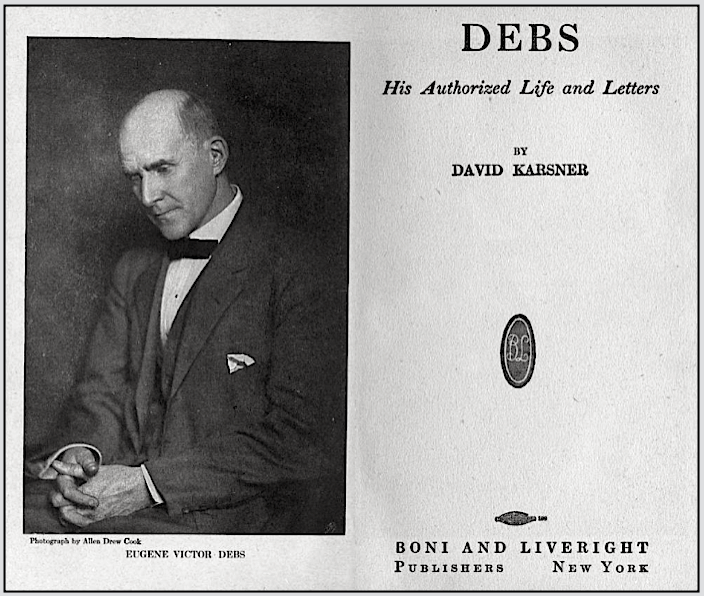 ———-
———-
Hellraisers Journal – Sunday February 22, 1920
David Karsner, of New York Call, “Paints Debs with Loving Hands” -Part I
From The Butte Daily Bulletin of February 13, 1920:
[Part I of II.]
“Debs, His Authorized Life and Letters,” has just gone into its second edition, (Boni and Liveright, New York). Written for socialists, by a socialist, it might well be termed a book for Americans, since socialism is the great issue of the present day. “Debs” is propagandist. And as such it should be a handbook of ready reference for those who agree with its doctrines, and for those whore aim it is to refute those doctrines. But the book primarily presents the emotional color of Debs’ socialism.
David Karsner, the author, paints Debs with loving hands. He is an ardent disciple. He depicts a man who is not a fiery leader, but rather one who is filled with good-will and a desire for peace on earth. Debs was not born a socialist. He was pushed, says the author by the logic of facts as he saw them, into the opinions that have finally caused his incarceration in prison. According to Karsner, his magnetism does not issue from flame, for he is not a “Red.” He is, says Karsner, a mild and greatly loved leader. He is said to have no desire for honors. Yet he was four times a candidate for the presidency of the United States.
Debs was born of poor but honest parents. And he did not become a socialist until after his imprisonment for contempt of court during the Pullman strike of 1894. His imprisonment determined him to espouse the cause of all the working classes, and to advocate their cause through the ballot, says Karsner. The day after his release from Woodstock prison, there appeared in “The Coming Age” a letter by Debs advocating the use of the ballot by working men as a means toward establishing “the co-operative commonwealth.” This fact might be a lesson to those who seek unadvisedly to stem the tide of radicalism. Debs learned socialism in prison. Is it likely that the present New York legislature is a hot-house that will force the young growth of social unrest?
Debs is presented as the gentlest man in modern literature. David Karsner, who has written this book, has drawn a picture of a man who is diametrically opposed to every conception that one might have of wild-eyed anarchism. The “Cotter’s Saturday Night,” according to Karsner, might have been written about Debs. The peacefulness of his home life, in a small miid-western city; the friendliness of his contact with the whole human world, is something at which one may marvel in a man who has antagonized so large a part of the world by his theories. The world, according to the author, is Debs’ friend and it is for his friends-the whole world-that he wants happiness.
The neighbors in his home town love him. They speak of him as Gene. His followers love him, says the author. The book is full of passages depicting the human affection which exists between Debs and the people he knew. There are embraces, not an American thing certainly, and understandable only in the light of the fact that Debs’ parents were French.
Debs was imprisoned at Woodstock-his school for socialism-he earned the affection of all his fallow-prisoners. To quote from the author: “No matter where he goes, what the circumstances are, or under whose auspices, Debs touches all with whom he comes in contact by his kindness and his love.” When he left Woodstock jail he carried in his pocket a testimonial from the inmates, as follows:
[To Eugene V. Debs, Esq.,
Woodstock, Ill.]We, the undersigned, inmates of Woodstock jail, desire to convey to you our heartfelt thanks and gratitude for the many acts of kindness and sympathy shown to us by you during your incarceration in this institution.
We selfishly regret your departure from here into the outer world and scenes of labor. Your presence here has been to us what an oasis in a desert is to the tired and weary traveler, or a ray of sunshine showing through a rift in the clouds.
With thousands of others we rejoice and extend to you our most earnest congratulations upon your restoration to liberty.
Hoping you may have a long, prosperous and happy life, success in all your undertakings, especially the American Railway union, we all join in wishing you Godspeed and beg to subscribe ourselves,
Your friends,
CHARLES E. ANDERSON,
EDWARD MADDEN,
PAUL WAMBACH,
W. E. HORTON.———-
Debs numbered among his friends such names as Eugene Field, James Whitcomb Riley, both of whom were admirers of the soft-hearted Gene, Wendell Phillips, Robert G. Ingersoll, Susan B. Anthony, Mrs. Ida Husted Harper, are mentioned in the book among his friends.
[Photographs, emphasis and paragraph breaks added.]
~~~~~~~~~~~~~~~~~~~~~~
SOURCES
Quote EVD, Be True Labor Will Come Into Its Own, OH Sc p1, Nov 5, 1919
https://www.marxists.org/history/usa/pubs/ohio-socialist/092-nov-05-1919-ohio-soc.pdf
The Butte Daily Bulletin
(Butte, Montana)
-Feb 13, 1920
https://chroniclingamerica.loc.gov/lccn/sn83045085/1920-02-13/ed-1/seq-3/
IMAGES
EVD, David Karsner, Debs Life n Letters, Brk Dly Egl p4, Jan 17, 1920
https://www.newspapers.com/image/55308619/
EVD, Debs by Karsner, Boni and Liveright, 1920
https://archive.org/details/debshisauthorize00karsrich/page/n7/mode/2up
See also:
Tag: David Karsner
https://weneverforget.org/tag/david-karsner/
Review: Life and Letters of Eugene V Debs by David Karsner
Debs: His Authorized Life and Letters
-by David Karsner
Boni and Liveright, 1919
https://books.google.com/books?id=U9cPAQAAMAAJ
Also found at Internet Archive and at HathiTrust
https://archive.org/details/debshisauthorize00karsrich
https://catalog.hathitrust.org/Record/004402827
~~~~~~~~~~~~~~~~~~~~~~~~~~~~~~~~~~~~~~~~~~~~~



